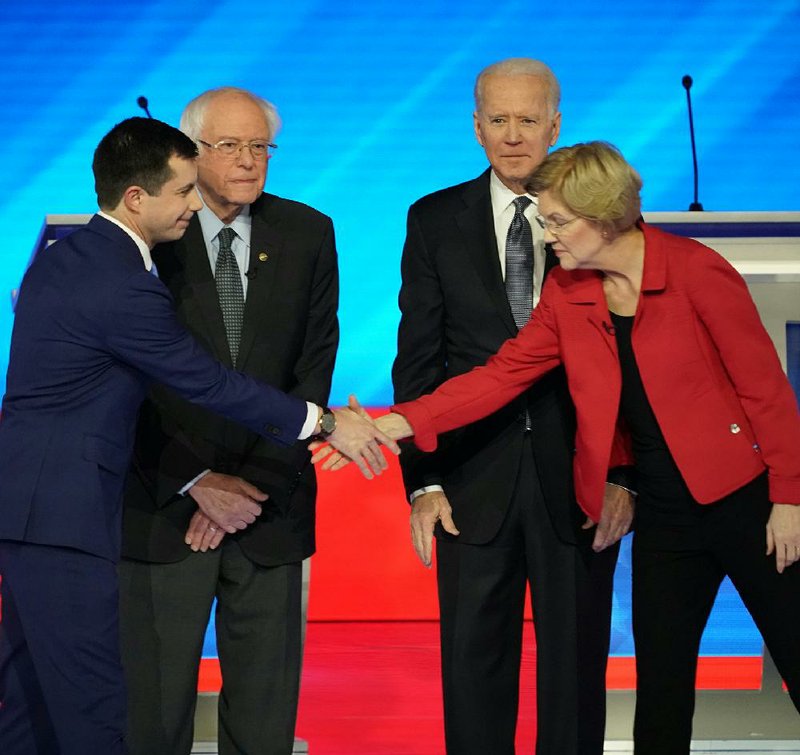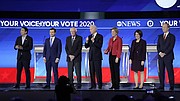MANCHESTER, N.H. -- The Democrats' top presidential contenders clashed over experience and electability in a debate Friday night that included former Midwestern mayor Pete Buttigieg, who was fresh off a top showing in Iowa.
Former Vice President Joe Biden predicted he would "take a hit" in New Hampshire's next-up primary election after a weak showing in Iowa. But he also raised questions about the long-term viability of leading rival Sen. Bernie Sanders, who identifies as a Democratic socialist, and Buttigieg, who has never served in elected office beyond the mayor of South Bend, Ind.
Sanders and Buttigieg emerged from Iowa on top, but Biden, Sen. Elizabeth Warren and Sen. Amy Klobuchar were fighting to prove to voters and donors alike that a legitimate path to the presidency remained.
Biden warned that nominating Sanders would brand down-ballot Democratic candidates with the label of socialism, while asserting that Buttigieg had shown no ability to mobilize black and Hispanic voters.
"Bernie's labeled himself, not me, a Democratic socialist," Biden said as he acknowledged his own political challenges.
"Turn the page," the 38-year-old Buttigieg said in a jab at the 77-year-old former vice president. "Now, we have to meet this moment."
Klobuchar of Minnesota, another moderate, said Democrats could not defeat "the divider in chief" by nominating a divisive candidate of their own, and in an even blunter exchange she accused Buttigieg of presenting himself as a "cool newcomer" by dismissing the value of service in Washington.
Klobuchar was among the candidates who took aim at Buttigieg, criticizing the millennial mayor for saying in his stump speech that the impeachment proceedings were "exhausting" and that he'd rather watch cartoons.
"It is easy to go after Washington. It is much harder to lead and much harder to take those difficult positions," she said.
And Klobuchar drew a comparison between Buttigieg's outsider message and that of the Democrats' shared adversary: "We got a newcomer in the White House," she said, "and look where it got us."
Sanders and Buttigieg gave no ground to their critics, arguing for their theories of the 2020 campaign. Sanders insisted that Democrats would win if they campaigned on "an agenda that works for the working people of this country," reigniting a debate about the practicality of single-payer health care. And Buttigieg batted away skepticism about his relative inexperience.
"I freely admit that if you're looking for the person with the most years of Washington establishment experience under their belt," he said, "then you've got your candidate and of course it's not me."
If elected, Buttigieg would be the youngest president ever elected and he has never served in elected office beyond the mayor's office.
"I'm interested in the style of the politics we need to put forward to actually finally turn the page," Buttigieg said.
"The politics of the past I think were not all that bad," Biden said. "I don't know what about the past about Barack Obama and Joe Biden was so bad."
The debate was heated at times, yet there were plenty of moments of unity.
Warren of Massachusetts avoided any direct criticism of her rivals and repeatedly pivoted to her core anti-corruption message. As Biden, Sanders and Klobuchar fought about the best way forward on health care, Warren did not engage, instead speaking broadly about the need to lower prescription drug costs.
And in between clashes over policy, Biden and Sanders called for party unity against President Donald Trump.
When a moderator asked Klobuchar to respond to Hillary Clinton's comments that no one likes Sanders, Biden walked over and gave him a hug. Klobuchar, meanwhile, joked that Sanders is "just fine" and noted times when they had worked together on policy.
"Our job is to look forward and not back to 2016," Sanders said. "And I hope that Secretary Clinton and all of us can come together and move forward."
Earlier, a somber Biden was appreciative when Buttigieg defended him and his son, Hunter, against attacks from Trump in the impeachment inquiry.
"We're not going to let them change the subject, this is not about Hunter Biden or Vice President Biden or any Biden. This is about an abuse of power by the president," Buttigieg said. "The vice president and I, and all of us, are competing but we've got to draw a line."
Biden encouraged the debate audience to give a standing ovation to Lt. Col. Alexander Vindman after Trump ousted him in retribution for his testimony during House impeachment proceedings.
Biden declared Friday that Trump "should be pinning a medal on Vindman, not Rush Limbaugh," the far-right radio personality to whom Trump awarded the Medal of Freedom on Tuesday.
Billionaire activist Tom Steyer and New York tech entrepreneur Andrew Yang, meanwhile, were fighting to prove they belong in the conversation.
Yang said Democrats are making a mistake when they act like Trump is "the cause of all our problems," adding that the president is "a symptom of a disease that has been building up in our communities for years and decades."
Former New York Mayor Mike Bloomberg remains a major unknown in the primary math, skipping debates and the first four states' elections while flooding the airwaves with hundreds of millions of dollars in ads and picking up significant endorsements. He's focusing on the big basket of Super Tuesday primaries on March 3.
Bloomberg didn't qualify for the debate in New Hampshire, however, the candidates onstage Friday night were asked several times about the former mayor.
Warren responded, "I don't think anyone ought to be able to buy their way into the nomination or to be president of the United States." She also said candidates shouldn't "suck up to billionaires to do it."
New debate rules set by the Democratic National Committee may let Bloomberg qualify for future debates.
SPARRING ON WAR
Biden also was forced to defend his long record in government as the candidates sparred yet again over the decision nearly two decades ago to send U.S. troops to Iraq.
Biden acknowledged anew that his vote in favor of the war authorization as a senator was a mistake, while Sanders said his Senate vote against deploying troops was proof of his judgment on national security issues. Buttigieg, who was in college at the time and later was deployed to Afghanistan, said he would have opposed the war, too.
Biden cautioned against pulling American troops entirely out of Afghanistan, saying such actions can lead to regional instability.
He was responding to Warren's remark that "it's time to bring our troops home" from Afghanistan, a position she has voiced in previous debates.
As it has before, health care also emerged as a flash point.
Both Biden and Klobuchar said Sanders' support for his signature Medicare for All single-payer health care plan was not realistic.
"I busted my neck getting Obamacare passed, getting every Democratic vote, I know how hard it is," Biden said, after accusing Sanders of obfuscating on how much his plan would cost.
Klobuchar questioned the political feasibility of the plan.
"I keep listening to this same debate and it is not real," she said, noting that two-thirds of Senate Democrats haven't signed on to Sanders' bill. "The [Affordable Care Act] is now nearly 10 points more popular than the president of the United States -- so why would we talk about blowing it up?"
When asked about the Supreme Court, the candidates agreed that they would appoint justices who would uphold the Roe v. Wade decision that legalized abortion, but there are distinctions on whether to try to expand the size of the court.
Buttigieg wants to expand the court through a constitutional amendment while also changing the way justices are selected. He disputed that his idea amounts to packing the court.
But Biden said any plan to expand the court is a bad idea. Biden noted that Supreme Court Justice Ruth Bader Ginsburg holds the same position.
On gun control, Sanders says he has evolved as he was pressed to explain a decades-old vote against background checks.
Sanders said that, coming from his largely rural state of Vermont, "we had virtually no gun-control legislation at all, and I represented that perspective."
But after mass shootings and gun violence, Sanders said, "The world has changed, and my views have changed." He also plugged his D-minus rating from the National Rifle Association.
IOWA BACKDROP
Friday marked the eighth debate in the Democratic Party's yearlong quest for a presidential nominee. The prime-time affair came just four days after Iowa's chaotic caucuses -- and four days before New Hampshire's primary -- with several candidates suddenly facing pointed questions about their political survival.
The results in Iowa left the Democratic primary electorate with no candidate yet emerging as a clear front-runner. Five candidates recorded support in the double digits -- Buttigieg, Sanders, Warren, Biden and Klobuchar -- and the top finishers earned little more than a quarter of the vote. Unless one of those candidates rises to sweep the remainder of the February contests, there is a high likelihood that Democrats will be headed for a long season of indecision, dragged out over dozens of primary elections.
About 176,000 Iowans attended their precinct caucuses, a slight uptick from 2016 but fewer than expected.
But Monday came nowhere near the 2008 caucuses, when roughly 238,000 Iowans participated in the kickoff clash among Hillary Clinton, Barack Obama, onetime Iowa favorite John Edwards and a handful of others. The 2020 caucuses did draw 5,000 more than 2016, when Clinton very narrowly beat Sanders, but went on to lose to Trump.
Information for this article was contributed by Steve Peoples, Hunter Woodall, Kathleen Ronayne, Will Weissert and Thomas Beaumont of The Associated Press; and by Alexander Burns and Jonathan Martin of The New York Times.
A Section on 02/08/2020

